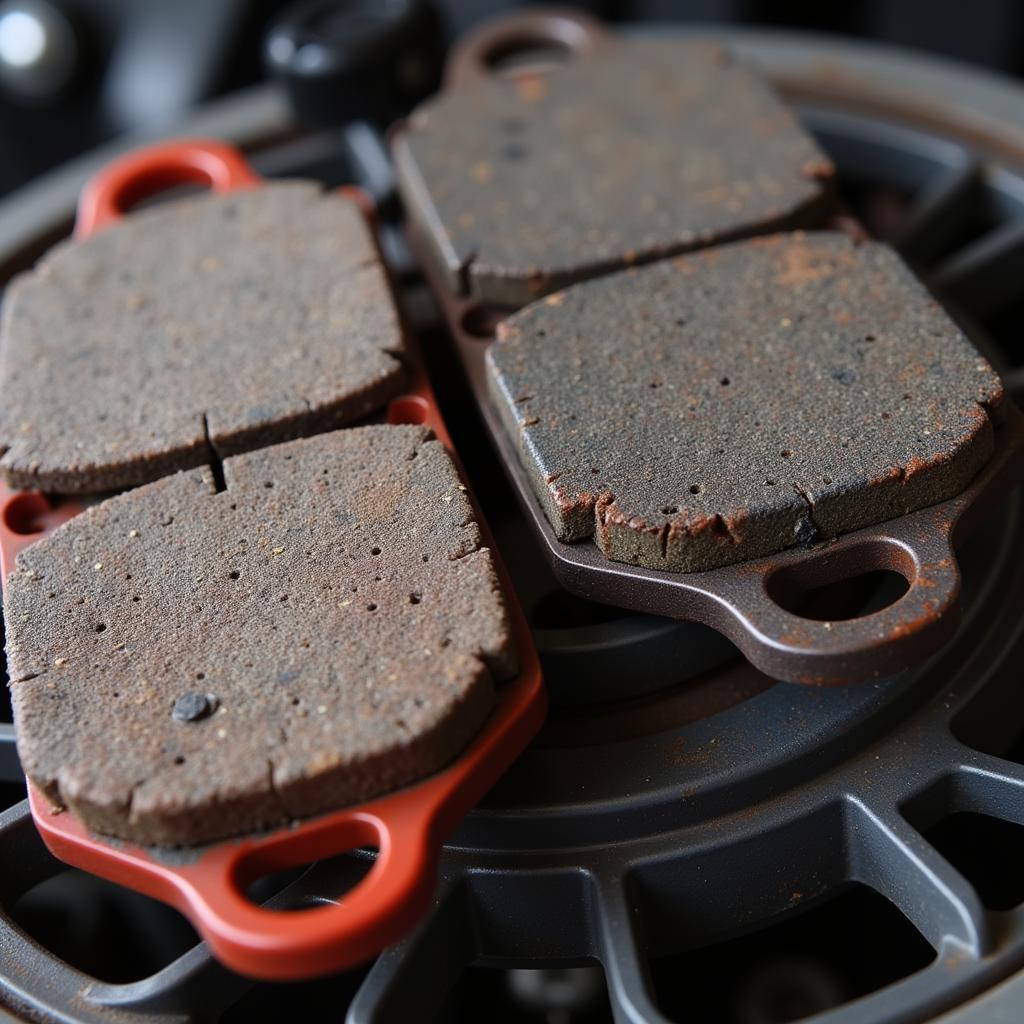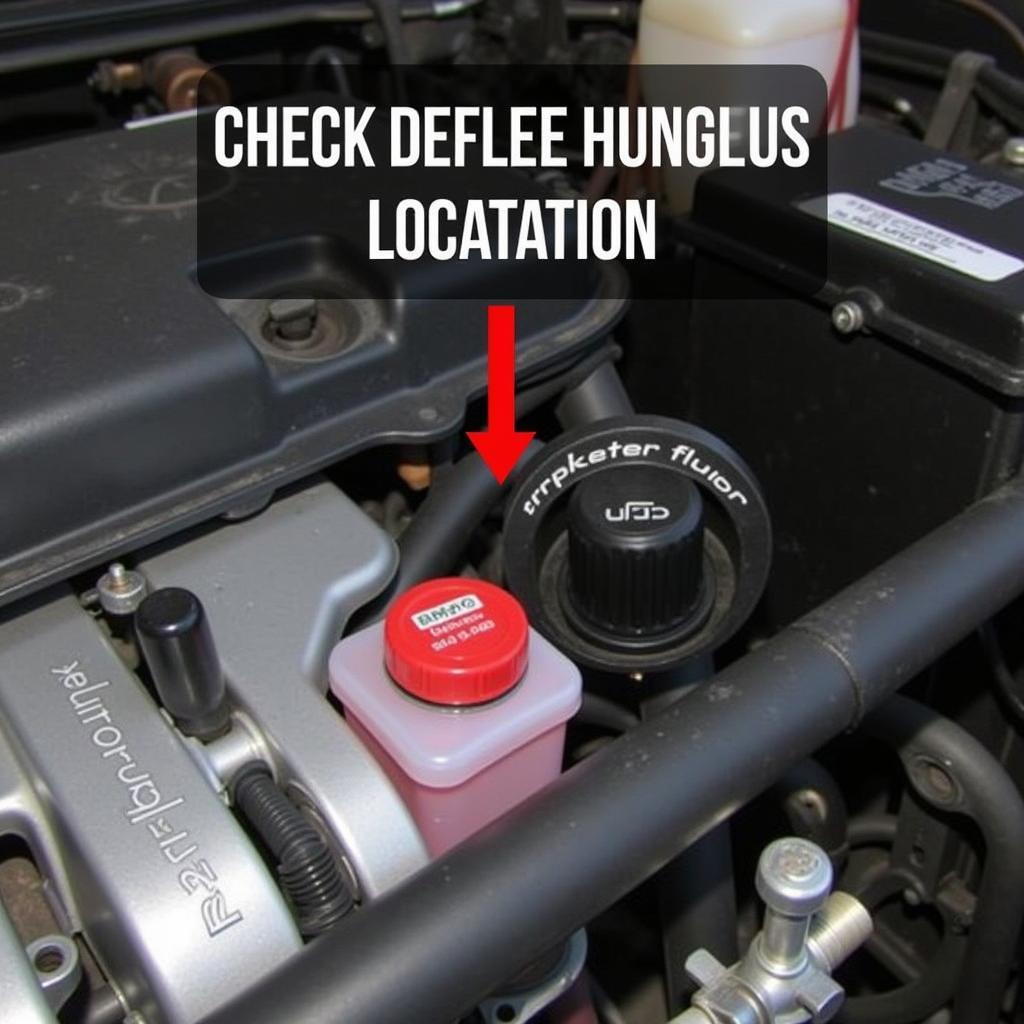The brake warning light on your dashboard is a crucial safety feature, and when it illuminates in your 2001 Honda Accord, it’s essential to address the issue promptly. Ignoring this warning could lead to reduced braking performance and potentially dangerous situations on the road. This article will explore the common causes of a 2001 Honda Accord brake warning light and provide insights into potential solutions.
Common Causes of a 2001 Honda Accord Brake Warning Light
Several factors can trigger the brake warning light in your 2001 Honda Accord. While some causes might be minor, others could indicate serious problems requiring immediate attention. Here are some of the most prevalent culprits:
1. Worn Brake Pads
 Worn Brake Pads
Worn Brake Pads
The most common reason for the brake warning light to turn on is worn brake pads. As you apply your brakes, the pads wear down over time. When they reach a certain level of thinness, a metal indicator embedded within the pad will contact the brake rotor, triggering the warning light on your dashboard. Regular brake inspections and timely pad replacement are crucial to prevent this issue.
2. Low Brake Fluid Level
Your Honda Accord’s braking system relies on hydraulic pressure created by brake fluid to function correctly. If the brake fluid level drops too low, it can trigger the warning light. This drop could signal a leak in the brake lines, calipers, or other components. Inspect your brake lines for leaks and consult a mechanic to identify and address the root cause of the low fluid level.
3. Faulty Brake Light Switch
The brake light switch, located near the brake pedal, activates the brake lights when you press the pedal. A malfunctioning brake light switch can not only prevent your brake lights from working but also trigger the brake warning light on your dashboard. If you notice your brake lights are not working or are staying on continuously, it’s crucial to have the switch inspected and replaced if necessary.
4. ABS System Malfunction
Your 2001 Honda Accord is equipped with an Anti-lock Braking System (ABS), designed to prevent wheel lockup during hard braking. If the ABS system encounters a problem, it can trigger the brake warning light. This could be due to a faulty ABS sensor, control module, or other components within the system. Diagnosing an ABS issue typically requires specialized diagnostic tools, so it’s best to consult a qualified mechanic.
Solutions for a 2001 Honda Accord Brake Warning Light
The solution for a brake warning light depends entirely on the underlying cause. Here’s a breakdown of potential solutions based on the common causes discussed above:
- Worn Brake Pads: Replace the brake pads on all four wheels. If one pad is worn, it’s generally recommended to replace them in pairs (front axle or rear axle).
- Low Brake Fluid Level: Refill the brake fluid to the appropriate level. If you suspect a leak, have a mechanic inspect the brake system and repair any leaks.
- Faulty Brake Light Switch: Replace the brake light switch. This is a relatively simple repair that can often be done at home with basic tools.
- ABS System Malfunction: Consult a qualified mechanic to diagnose and repair the issue. They will have the necessary tools and expertise to pinpoint the problem within the ABS system.
Important Note:
Ignoring a brake warning light can lead to hazardous driving conditions. Addressing the issue promptly ensures your safety and the safety of others on the road. If you’re unsure about diagnosing or fixing the problem yourself, seek professional help from a qualified mechanic.
FAQs:
1. Can I still drive my car with the brake warning light on?
It’s not recommended to drive your car with the brake warning light on. It indicates a potential issue with your braking system, which could compromise your safety. It’s best to identify and address the problem immediately.
2. How much does it cost to fix a brake warning light on a 2001 Honda Accord?
The cost to fix a brake warning light varies depending on the underlying cause. Simple fixes like replacing brake pads or a brake light switch can be relatively inexpensive. However, repairs involving the ABS system or other major components can be more costly.
3. How often should I check my brake fluid level?
It’s a good practice to check your brake fluid level at least once a month. Inspect the fluid level in the reservoir and top it up if necessary. Remember to use the correct brake fluid type specified in your owner’s manual.
4. Can I reset the brake warning light myself?
While it’s possible to reset the brake warning light in some cases, it’s not recommended unless you’ve addressed the underlying problem. Resetting the light without fixing the issue will only mask the problem, potentially leading to dangerous situations down the line.

